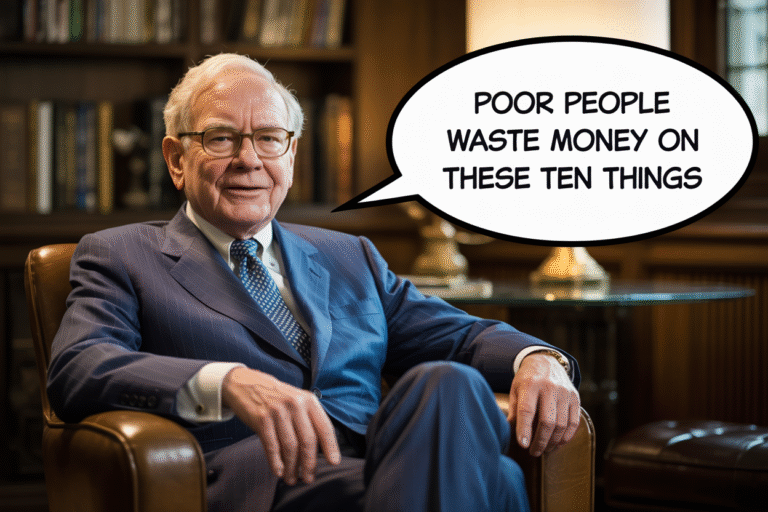Warren Buffett’s Financial Principles for Lasting Wealth
Warren Buffett, known as the Oracle of Omaha, has amassed a net worth exceeding $144 billion through his leadership at Berkshire Hathaway. Remarkably, he leads a frugal lifestyle, residing in the same house he bought decades ago and opting for modest vehicles. His financial wisdom is applicable to individuals across all income levels, offering timeless lessons for anyone aiming to build wealth. Central to his philosophy is the principle, “Do not save what is left after spending, but spend what is left after saving.” This outlook, paired with his insight into compound growth, helps elucidate why certain spending habits can hinder wealth accumulation.
1. Prioritize Paying Off High-Interest Credit Card Debt
Buffett’s view on credit card debt is stark and uncompromising; he states, “If I borrowed money at 18% or 20%, I’d be broke.” High-interest debts, commonly around 20%, can severely hamper financial health and wealth-building efforts. Buffett urges individuals to focus on eliminating such debts before exploring investment opportunities. The cold, hard truth is that consistently earning returns that surpass credit card interest rates is an uphill battle. Therefore, debt elimination is one of the surest “investments” one can make.
2. The Financial Drain of New Cars
Buffett’s perspective on vehicle purchases underscores his practical approach to depreciating assets. He notes, “I only drive about 3,500 miles a year, so I don’t buy new cars often.” New cars typically lose around 20% of their value within the first year, marking a significant financial loss. Instead of splurging on the latest model, Buffett recommends opting for more economical choices, such as slightly dented cars at reduced prices, reaffirming that cars should serve as functional transportation rather than status symbols.
3. Avoid Gambling and Lottery Tickets
During a 2007 shareholders meeting, Buffett deemed gambling “socially revolting.” He emphasizes the importance of informed decision-making rooted in knowledge and understanding. Gambling deviates from his disciplined, methodical approach to wealth accumulation and often leads individuals to chase fleeting fortunes rather than building sustainable wealth through calculated, long-term strategies.
4. Cut Back on Expensive Dining and Entertainment
Reflecting his broader view of simplicity over excess, Buffett’s dietary habits are straightforward. He states, “I could eat a ham sandwich every day for fifty days for breakfast.” His inclination toward budget-friendly dining options, even when entertaining friends like Bill Gates at McDonald’s, shows that extravagant spending isn’t necessary for enjoyment. Buffett’s lifestyle emphasizes finding satisfaction in the basics rather than indulging in lavish meals.
5. Limit Impulse Purchases
Buffett warns against impulse buying: “If you buy things you do not need, soon you will have to sell things you need.” This advice serves as a valuable reminder to distinguish between wants and needs in financial choices. By integrating waiting periods before making non-essential purchases, individuals can sidestep the traps of reactive spending, fostering healthier financial habits.
6. Recognize the Long-Term Cost of Smoking and Other Habits
Buffett has insightfully noted, “Chains of habit are too light to be felt until they are too heavy to be broken.” High-cost habits, like smoking, can jeopardize both health and finances over time. These small daily expenses may appear insignificant, but their cumulative impact can hinder wealth-building efforts. Acknowledging these habits allows individuals to redirect their resources toward investments that yield long-term benefits.
7. Invest in Self-Education
Buffett’s assertion that “the most important investment you can make is in yourself” highlights the value of knowledge as a powerful asset. Dedicating time to reading and self-education enables continual growth and improvement. Buffett spends about 80% of his day reading and encourages others to adopt the same approach, affirming that educational investments appreciate over time unlike physical possessions.
Conclusion: The Path to Financial Wisdom
Warren Buffett’s financial philosophies emphasize that wealth accumulation is less about earning large amounts and more about avoiding unnecessary losses. Each spending decision should be approached with intentionality, weighing immediate desires against long-term investment potential. Implementing Buffett’s insights into daily financial practices can help anyone transform their spending habits, regardless of current income levels, fostering a foundation for lasting prosperity.

